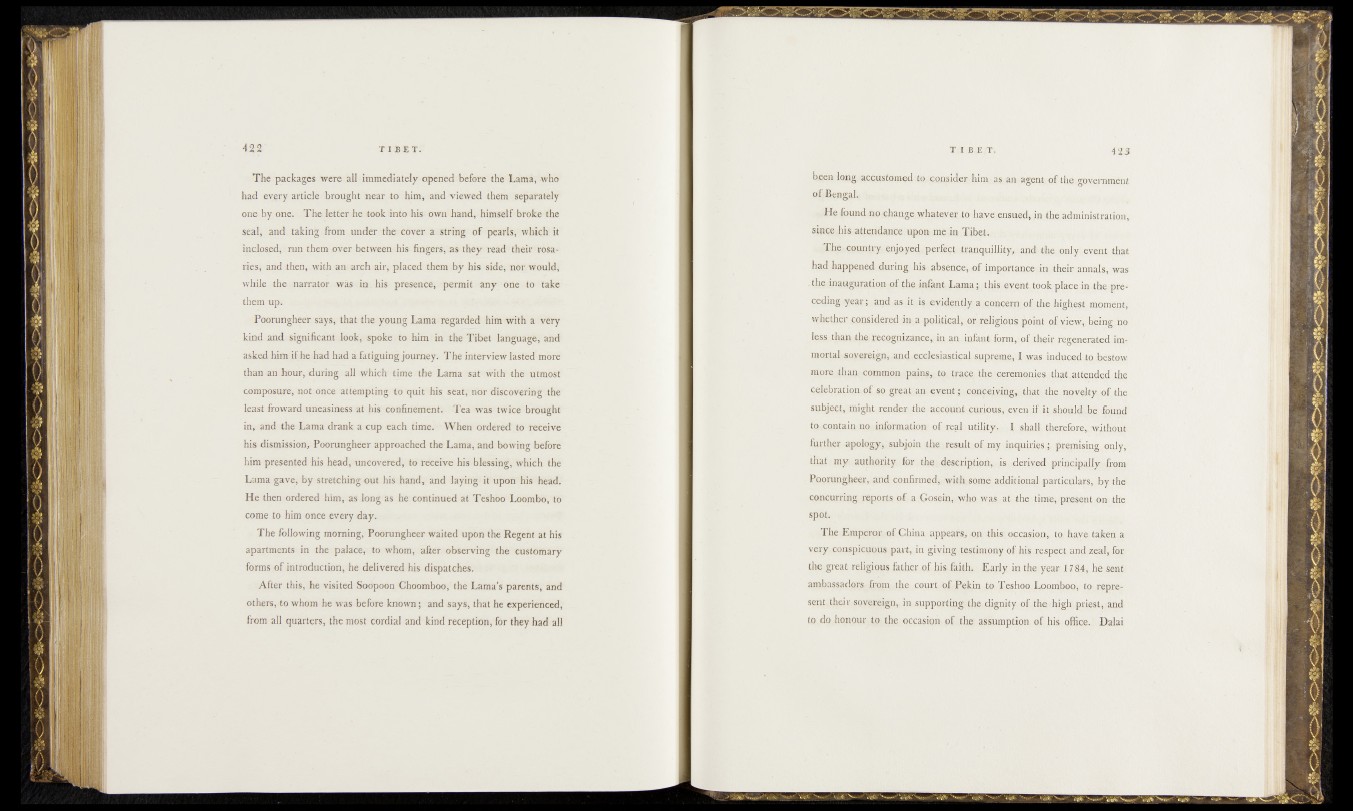
The packages were all immediately opened before the Lama,-who
had evgry article brought near to him, and viewed them separately
one %.sns* The fetter-he took into his own hand, himself broke the
seal, and taking from under -the cover a. string of pearls, which it
inclosed, ; run them over between his fingers, as they read their rosaries,
and then, with an arch air, placed them by his side, nor would,
while the narrator was in, his presence', permit any. one to take
them up.
Poorungheer says, that the young Lama regarded him with a very
kind and significant look, spoke to him in the Tibet language; and
asked him if he had had a fatiguing journey. The interview lasted more
than an hour, during all which time the Lama sat with the Utmost
composure, not once attempting to quit his seat, nor discovering the
least froward uneasiness at his confinement. Tea was twice brought
in, and the Lama drank a cup each time. When ordered to receive
his dismission, Poorungheer approached the Lama, and bowing before
him presented his head, uncovered, to receive Ins blessing, which the
Lama gave, by stretching out his hand, and laying-it upon his head.
He then ordered him, as long as he continued at Teshoo Loombo, to
come to him once every day.
The following morning, Poorungheer waited upon the Regent at his
apartments in the palace, to whom, after observing the customary
forms of introduction, he delivered his dispatches.
After this, he visited Soopoon Choomboo, the Lama’s parents, and
others, to whom he was before known; and says, that he experienced,
from all quarters, the most cordial and kind reception, for they had all
been long acve,qsturned fa?, thf,?gnv,ftmtn<*nt
oh®,enpd.} Sk
He >jound/i^^hatjgg,eg,-fjQ»haye jensued, in thq, administration,
since.his attendance upon*-me tin, Tibet.:
.The, co i^ ^ j^ n ^ y ed ^ p e^ ^ ^ an q u illi^ and-the, oqjiyt.qvfe ^ s,that
had happened during his jjabsence^,of i^portance^in,jt^e}T|;axnials, was
-^jMwigWgtion -of,tjie, infant Lama >!, tjjjsveypntv^f^p^acefKH^tfaerore-
cedjng year; and as it is|jeyident|sg.a4Cp^ernsjo|''tiie hjgj^gt) moment,
whether considered in a political, or,relmous„ponjt ol vicvyaijuing^no
less lhan thG recognizance,, in an,, iylant forui^iMtheir regenerated jm-,1
mortal -sovereign,,and,eqcjfisiastical supfgn^T was in^qsdt^hestw .
rtjore.^han-comrnon pains, to#}fa^q| I
so great an event; conceiving, that thg. noyqJty^iLthe
subject maight renefer the account ejfesjjf it, shO]ildf, he found
tQ contain no information ol ical utility I shall, there(oro^'WJthoi*fc I
further apology ^subjoin the,result of,my 'j^qfiiri^s,;*fr.epiisingLonl}y,,j
that my authority for the, description,, ris>, ..derived pp^cipaHy^rnm
Poorungheer, and confirmed, with some additionaTpS^tjcula^why thdj
concurring reports of a Gosein,- who was at the time,-present omthe
spot.
The Emperor qf China appears, ^ th is ; occasion,, to, have, t^eraa.l
very, conspicuous-part,, in giving testimony of his respect anil zeal,dote]
the great religious father, nf his faith. Early in the,year 17 8.4, he sent-
ambassadors from the court. bJ^Rqkin ,to Teshoq, Lpomhoo, to* represent
their sovereign, in supporting-the dignity of -the *high priest j and
to do honour to tfie occasion of the assumption of hisioffice-^ Dalai